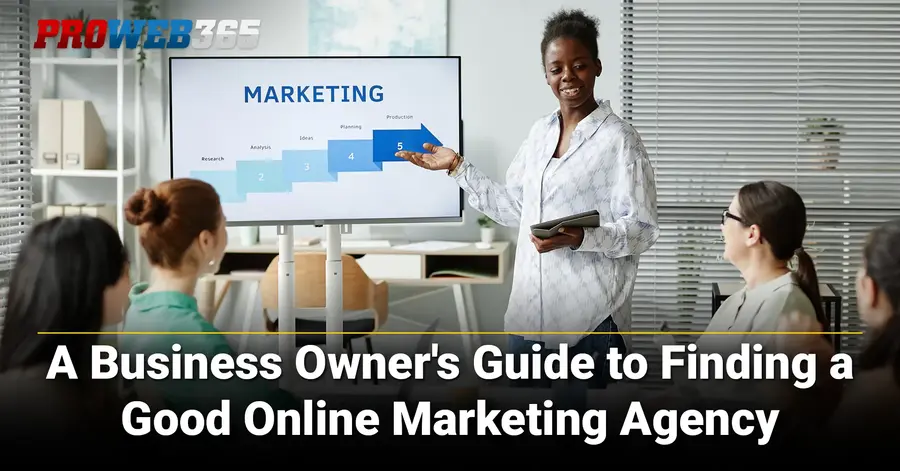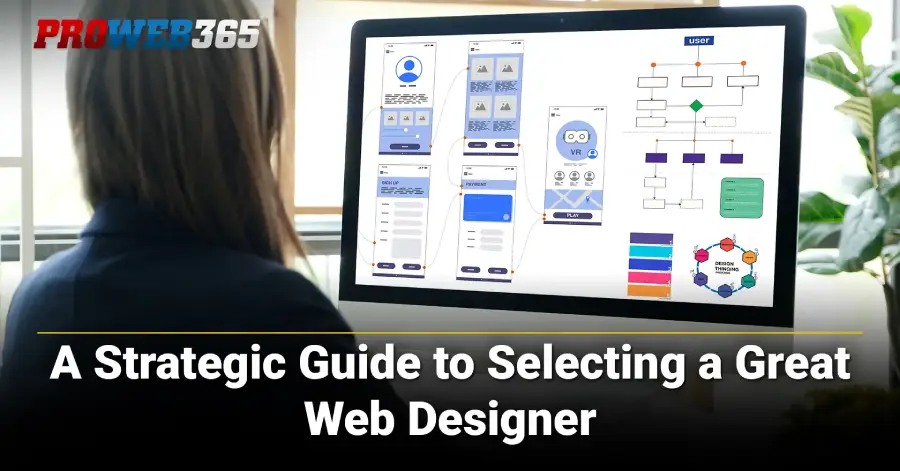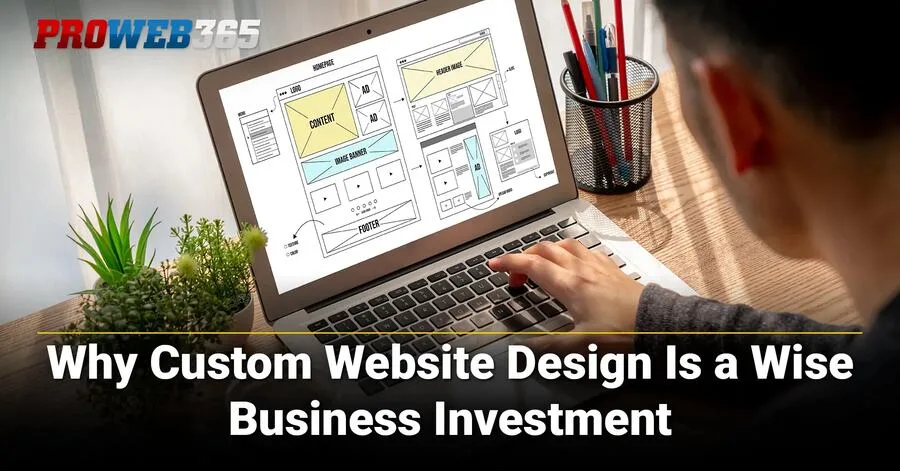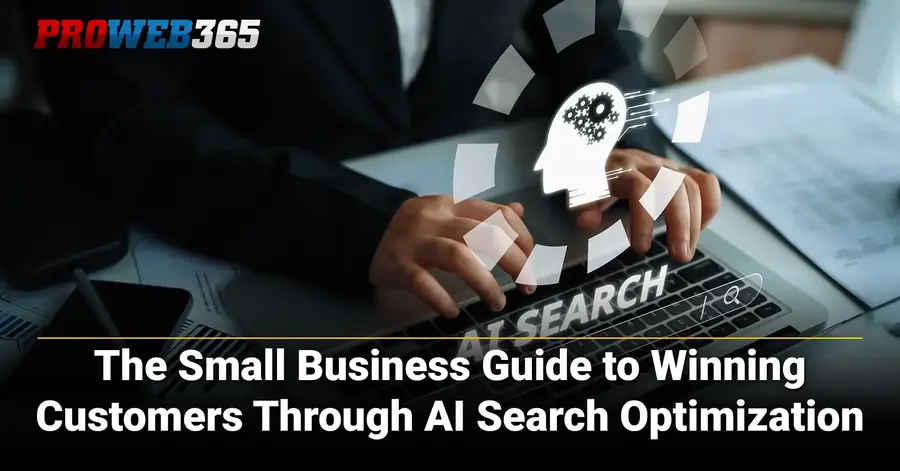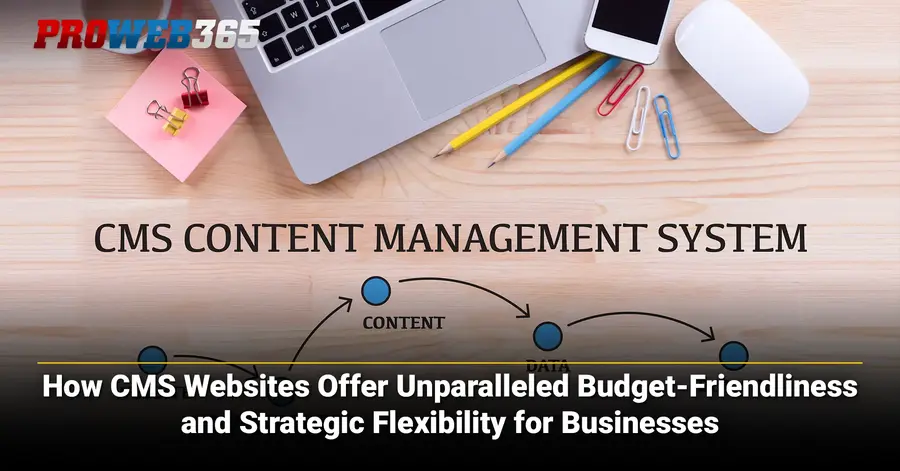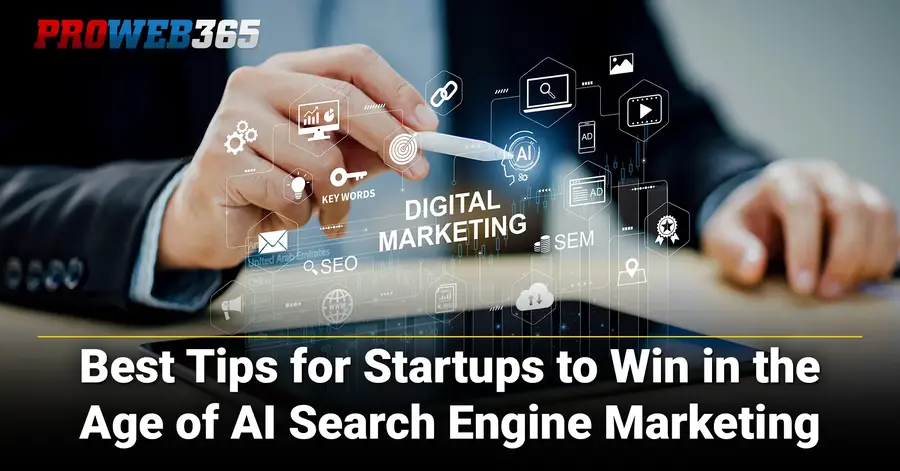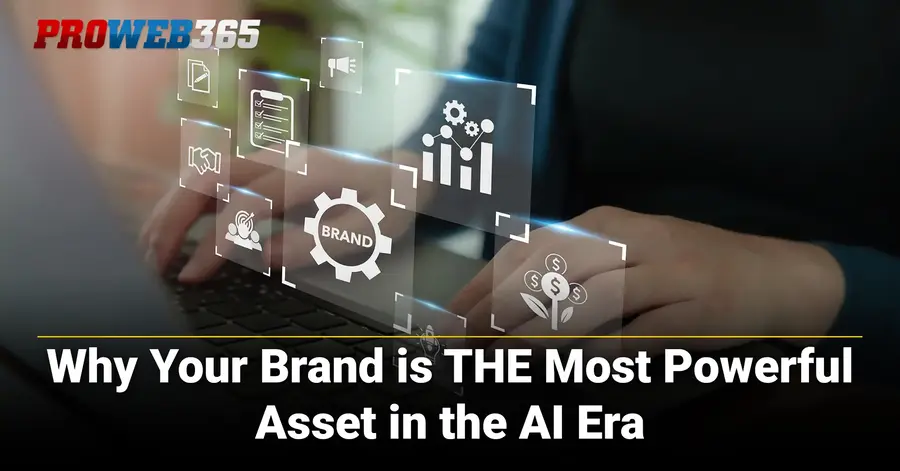Why Content Marketing is Your Small Business's Superpower in the AI Search Era
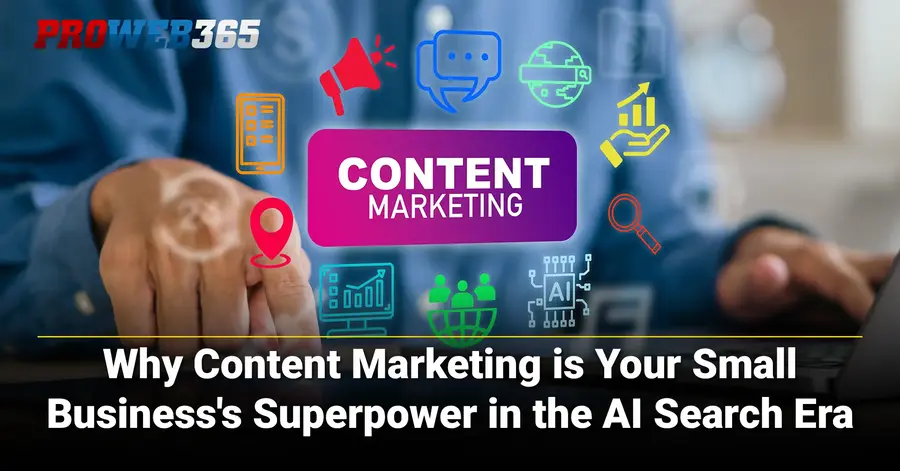
Artificial intelligence (AI) is completely changing how search engines work, shifting the focus from simple keywords to understanding what people really want to find. For small businesses, this new digital landscape is a massive opportunity. Content marketing, which is all about creating valuable online content, has become a powerful tool that offers a better return on investment (ROI) than traditional marketing and helps you build trust with customers. To succeed, you must adapt your strategy to focus on
Key Takeaways:
- AI is Reshaping Search: AI is fundamentally changing how search engines work, moving beyond keywords to understanding user intent and providing direct answers.
- Content Marketing is Essential: It offers superior ROI, measurability, and personalization compared to traditional marketing.
- Generative Engine Optimization (GEO): A new focus is needed to ensure your content is visible and cited by AI models.
- Build Trust with E-E-A-T: Demonstrating Experience, Expertise, Authoritativeness, and Trustworthiness is crucial for credibility.
- Leverage AI Tools Strategically: Use AI to enhance your content workflow but always maintain human oversight for authenticity.
A Guide to Finding a Good Online Marketing Agency
To build a commanding online presence, especially as a mid-size business or organization, a variety of factors need to come together and be executed effectively. Understanding your audience and connecting with them requires a high-performing...1. The New Digital Landscape for Small Businesses
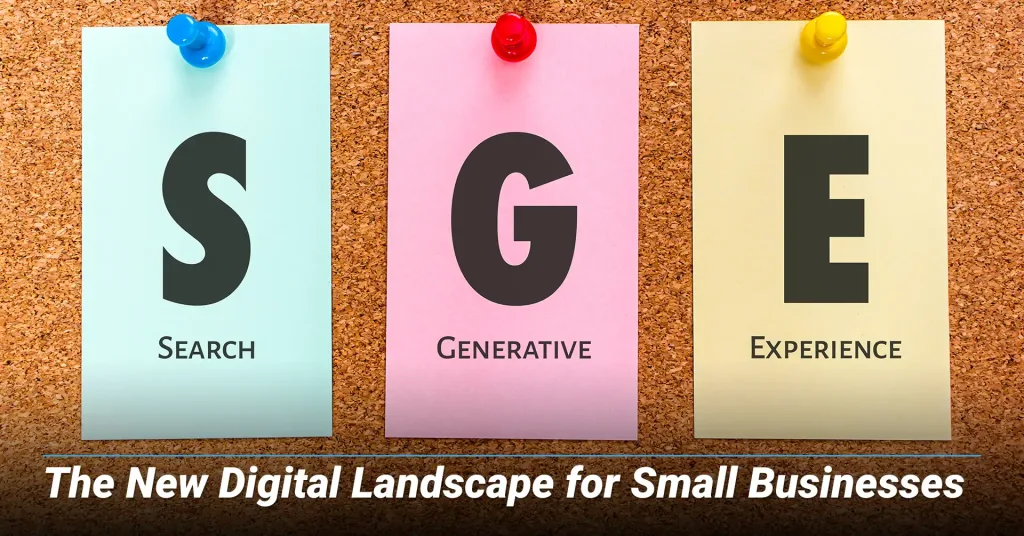
The digital world is rapidly transforming due to Artificial Intelligence (AI). For small to mid-size businesses, understanding this shift is crucial. Search engines, once simple keyword-matching tools, now use AI to understand human language and intent, delivering more accurate results.
AI-powered algorithms interpret natural language, predict user intent, and provide high-quality results, constantly improving through deep learning. Google integrates AI technologies like RankBrain, BERT, and Search Generative Experience (SGE) to enhance search accuracy and provide summarized answers. This means users ask full, conversational questions, expecting direct answers, not just links.
Content strategy must shift from keyword-centric to problem-solving and answer-first, anticipating how users ask AI assistants. AI's understanding of context and semantic relationships means isolated keywords are less powerful. AI search engines now evaluate the meaning and comprehensive topical coverage of content.
This makes holistic, interconnected content and topical authority more valuable than fragmented, keyword-optimized pages. Small to mid-size businesses should aim to be definitive resources in their niche.
To illustrate this profound change, consider the differences between traditional and AI-powered search:
| Criterion | Traditional Search | AI-Powered Search |
|---|---|---|
| Query Understanding | Exact keyword matching | Natural language processing |
| Keyword Focus | High keyword density | User intent & semantic context |
| Result Format | List of blue links | AI Overviews/Summaries/Direct answers |
| Personalization Level | Limited (basic geo-targeting) | Highly personalized (behavior, context, location) |
| Learning Mechanism | Rule-based algorithms | Machine learning/Neural networks |
| User Interaction Style | Typing short phrases/keywords | Conversational queries/Voice search |
A. Why Content Marketing Matters More Than Ever
In this AI-driven landscape, content marketing is a strategic cornerstone for small and mid-size businesses. It's digital, focusing on online content production and distribution. It's also affordable, often 62% cheaper than traditional marketing, and generates three times more leads.
Unlike traditional one-way, broad targeting, content marketing fosters two-way conversations and higher engagement. Its digital nature provides measurable analytics, allowing businesses to optimize campaigns. SEO, amplified by AI, levels the playing field: a well-optimized small business site can outrank a large company's poorly optimized one.
AI prioritizes natural, helpful, and authoritative content that demonstrates E-E-A-T (Experience, Expertise, Authoritativeness, and Trustworthiness). This means small businesses with valuable, AI-optimized content can gain significant visibility over large corporations. The focus shifts from spending power to information quality and relevance.
AI search now offers curated, direct responses, not just link lists. This means visibility is about being the AI's direct answer. Engagement shifts from clicks to consuming synthesized summaries. Small businesses must aim for "featured snippet" or "AI Overview" visibility, requiring content that is answerable, summarizable, and authoritative for AI citation.
B. Who This Guide Is For: Empowering Small to Mid-Size Business Owners
This comprehensive guide is specifically crafted for small to mid-size business owners looking to understand and leverage content marketing's transformative power in the age of AI search. It aims to demystify complex concepts, provide actionable strategies, and empower businesses to adapt their marketing efforts for sustainable growth in this new digital era.
A Strategic Guide to Selecting a Great Website Designer
When you're a small to mid-size business owner or organizations, a website is more than just an online brochure; it's a foundational pillar for your identity, operations, and growth. In the AI era, a professional,...2. Understanding AI in Search: A Game Changer
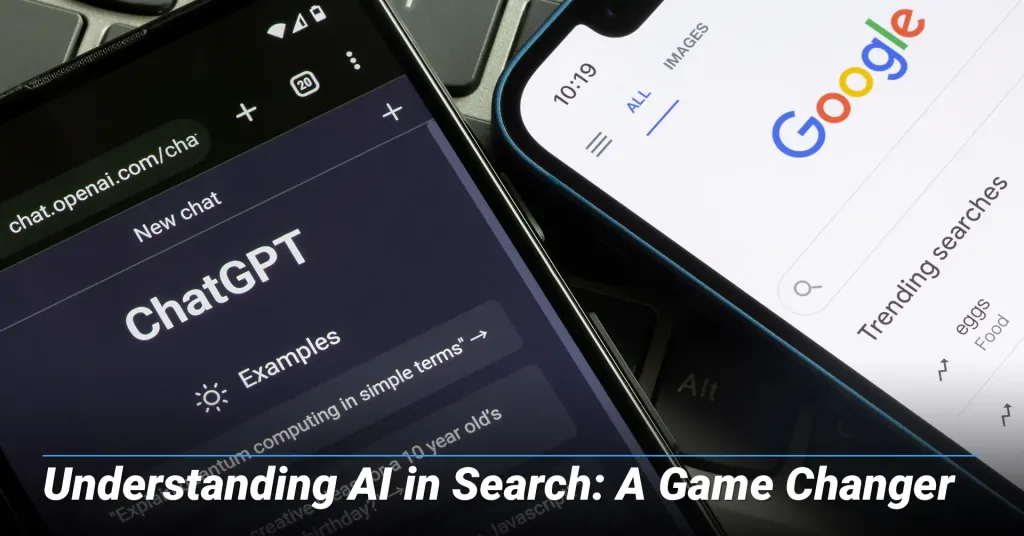
A. How AI is Reshaping Search Engines
AI is central to modern search engine evolution, enabling machines to analyze data, identify patterns, and make predictions. This fundamentally changes how search engines operate. AI refines query understanding, with features like predictive search generating precise outcomes from ambiguous queries.
AI systems interpret natural language, predict user intent, and deliver high-quality results, constantly improving through deep learning. Google integrates AI like RankBrain, BERT, and SGE for enhanced accuracy and summarized answers. This makes search engines more intuitive and personalized, moving towards seamless user interactions.
Generative AI is shifting search from lists of links to direct answers, summaries, and conversational interactions. The search engine itself becomes a direct information source. Small businesses must design content that is understandable and synthesizable by AI, structured for easy extraction of facts and summaries.
This requires clarity, conciseness, and authoritative presentation. AI also personalizes results based on search history and behavior. While beneficial for users, this challenges content visibility if user profiles don't align. Therefore, small businesses must develop specific buyer personas and tailor content accordingly.
B. Beyond Keywords: The Rise of User Intent
In the AI age, keyword stuffing is harmful. User intent — the purpose behind a search — is the new focus. AI tools now identify intent beyond keywords. Understanding these four types is crucial for content strategy:
| Intent Type | User Goal | Example User Queries | Ideal Content Type for SMBs |
|---|---|---|---|
| Informational | Learn/Understand | "How to start a small business," "What is content marketing ROI?" | Blog posts, How-to guides, FAQs, Educational articles |
| Navigational | Find a specific brand/site | "YourBrand.com login," "Netflix subscription plans." | Brand's homepage, About Us page, Contact page |
| Commercial Investigation | Research/Compare options | "Best CRM for small business," "Gardening tools reviews." | Product reviews, Comparison guides, Case studies |
| Transactional | Make a purchase | "Buy iPhone 15 Pro Max online," "Subscribe to Canva Pro." | Product pages, E-commerce listings, Pricing pages, Landing pages with CTAs |
Google prioritizes relevant content. Keyword stuffing is a manipulative practice detected by AI, leading to ranking drops. AI favors natural, helpful content. Conversational search makes long-tail keywords valuable because they convey clearer user intent.
This shift from keywords to understanding user purpose is strategic. Small businesses must use sophisticated audience research to grasp the "why" behind queries. Content strategy must start with empathy for the customer's journey, creating diverse content for each buyer stage that serves specific user intent.
Why Custom Website Design is a Wise Business Investment
A strong online presence is essential for small and mid-size businesses (SMBs) today. A website acts as your virtual storefront, 24/7 sales representative, and above all, the first impression for potential customers. With rapid expansion...C. The Impact of AI Overviews and Generative AI Responses
AI Overviews (formerly SGE) and generative AI responses are visibly changing search. AI-generated summaries, appearing in ~30% of results, save time and improve information accessibility. Users increasingly prefer LLMs like ChatGPT, Perplexity, and Gemini for curated, direct responses over link lists.
This shift impacts website traffic significantly. AI Overviews reduce Google traffic to publishing sites, as Google summarizes multiple webpages, leading to fewer clicks. This "zero-click" phenomenon means users may bypass original sites entirely.
However, clicking traffic is more motivated and engaged, seeking deeper validation or ready to convert. Small businesses must adjust expectations from raw traffic to "being the definitive answer" in AI summaries. KPIs should shift from traffic volume to engagement and conversion rates.
For content to be pulled into AI Overviews, it must be clear, authoritative, and provide quick answers. Small businesses need content structures that facilitate easy extraction:
| Content Element | AI Optimization Strategy |
|---|---|
| Headings | Clear, descriptive, question-based |
| Opening Paragraphs | Direct answers within first 100 words |
| Lists & Tables | Structured data for easy AI parsing |
| Summaries | Concise key takeaways in each section |
| Technical Terms | Simple explanations alongside jargon |
| Evidence | Cited sources and data points |
D. What is Generative Engine Optimization (GEO)?
Generative Engine Optimization (GEO) is a new discipline emerging as AI transforms search. It optimizes content for generative AI models and LLMs (like ChatGPT, Gemini, Perplexity) to ensure understanding and citation. Unlike traditional SEO, GEO focuses on making content accessible to AI-generated summaries and direct answers.
GEO ensures AI systems grasp the content's broader context and brand relation. ChatGPT's results overlap only 61% with Google and 68% with Bing, meaning traditional SEO is insufficient. Platform-specific strategies are needed for each AI system.
Brands gain LLM visibility through generated answers and cited sources. For AI inclusion, content must be well-structured, clear, authoritative, contextually relevant, and aligned with natural user questions. GEO prioritizes depth and contextual relevance over keyword density.
Small businesses need a dual strategy: one for traditional web search results (SEO) and another for generative AI responses (GEO). Success requires understanding each engine's unique preferences. The following comparison highlights key differences:
| Aspect | Traditional SEO | Generative Engine Optimization (GEO) |
|---|---|---|
| Primary Focus | Keywords & backlinks | Context & comprehension |
| Content Structure | H1-H6 tags, meta data | Semantic relationships |
| Success Metrics | Rankings & traffic | AI citations & mentions |
| Optimization Target | Search engine crawlers | AI language models |
| User Journey | Click-through to website | Direct answer consumption |
The Small Business Guide to Winning Customers Through AI Search Optimization
The internet is constantly evolving, and AI in search engines is being used to find business for customers. For small to mid-size business owners, understanding and adapting to these technological advances is crucial for growth....3. Building Trust and Authority: The E-E-A-T Framework
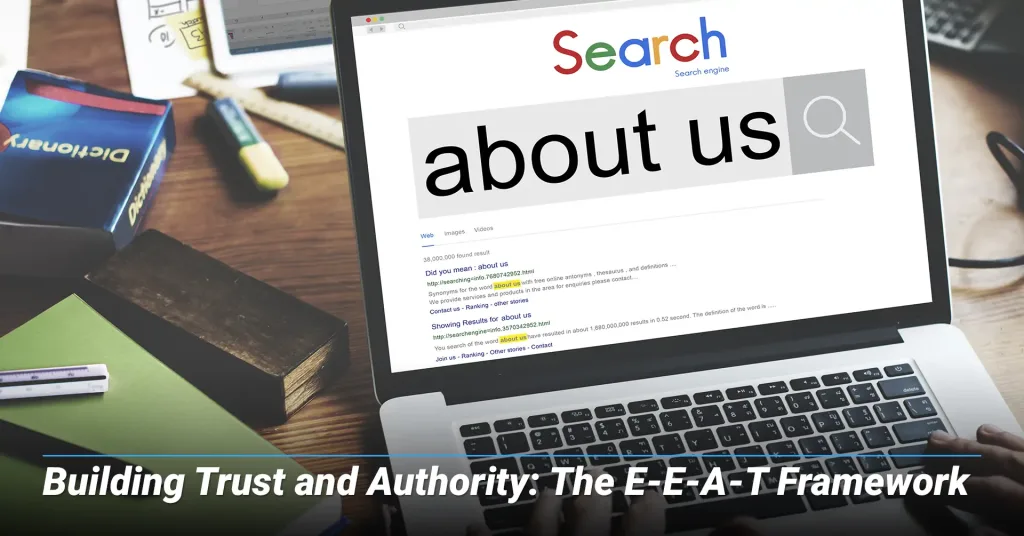
In the age of AI search, Google highly values content quality and credibility, encapsulated by the E-E-A-T framework. While not a direct ranking factor, E-E-A-T assesses content quality and influences rankings, with trustworthiness being the most important element.
A. Understanding Each Element of E-E-A-T
E-E-A-T represents four critical components that search engines and AI models evaluate:
- Experience: Firsthand or life experience on the topic (e.g., product review by actual user). Added by Google in 2022, emphasizing genuine involvement.
- Expertise: Author's knowledge or skill (e.g., a plumber writing about leaks). It can be formal education or practical experience.
- Authoritativeness: Content creator or website is a respected, go-to source in the field (e.g., Vogue for fashion trends).
- Trustworthiness: Accuracy, honesty, safety, and reliability of the site and content. Requires accurate facts and reputable sources.
E-E-A-T is especially crucial for "Your Money or Your Life" (YMYL) topics affecting health, finances, or safety. These topics require the highest levels of expertise and trustworthiness.
B. Practical Ways for Small Businesses to Build and Demonstrate E-E-A-T
Building E-E-A-T varies by business, but these strategies help establish credibility:
Leverage Experts: Feature individuals with genuine experience or expertise. Credit authors clearly and link to professional profiles. Include detailed author bios that highlight relevant qualifications and experience.
Add Unique Value: Don't rehash existing content. Identify knowledge gaps in top-ranking content and fill them with original contributions, data, or perspectives that competitors haven't covered.
Build Positive Brand Reputation: Consistently produce high-quality content that others want to reference. Encourage customer reviews and testimonials, and secure backlinks from reputable sites in your industry.
The following table outlines specific E-E-A-T building actions:
| E-E-A-T Component | Actionable Strategies for SMBs |
|---|---|
| Experience | Share case studies, customer stories, behind-the-scenes content. |
| Expertise | Display certifications, publish detailed guides, showcase team credentials. |
| Authoritativeness | Guest post on industry sites, earn media mentions, win industry awards. |
| Trustworthiness | Clear contact info, transparent policies, secure website, accurate citations. |
Additional Trust-Building Strategies:
- Ensure a comprehensive "About Us" page with your brand's story, team, awards, and testimonials.
- Optimize on-page SEO with natural keyword use and mobile-friendly design.
- Keep content updated every 6-12 months to maintain relevance.
- Encourage engagement through clear calls to action.
- Maintain a consistent publishing schedule to show reliability.
How CMS Websites Offer Budget-Friendliness and Strategic Flexibility for Businesses
Content Management Systems (CMS) empower small to mid-size businesses (SMBs) to build and grow their online presence affordably and efficiently. To better understand, a report on how CMS platforms offer cost-effectiveness and remarkable adaptability, enabling...4. Strategic Content Marketing for Small to Mid-Size Businesses in the AI Age
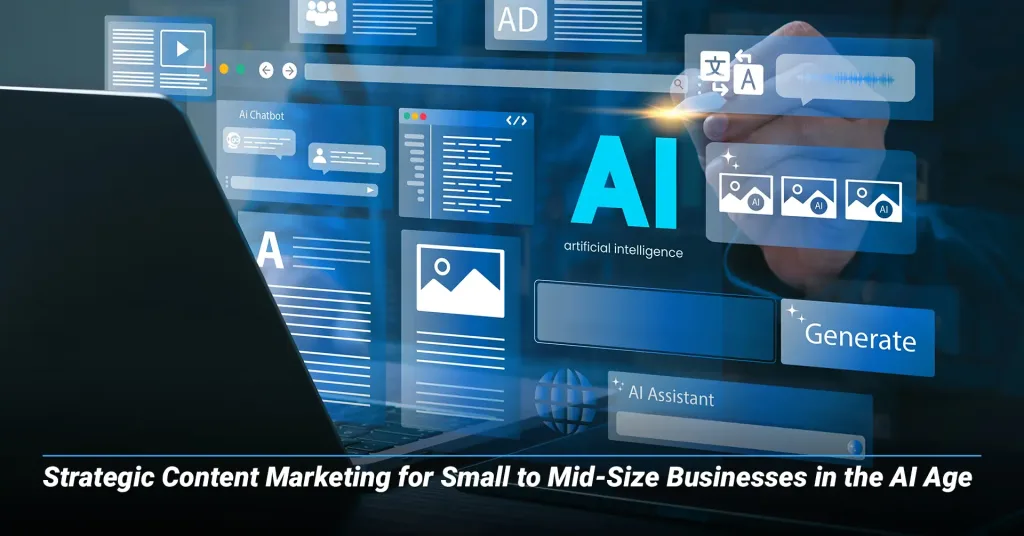
Adapting content marketing for small to mid-size businesses in the AI age requires strategic planning, efficient execution, and focus on long-term value. Success comes from working smarter, not harder.
A. Content Marketing on a Budget: Strategies that Work
For businesses with limited resources, maximizing impact with minimal spend is paramount. The key is strategic focus and smart resource allocation.
Double Down on What Works: Use data to guide strategy. Analyze content performance to identify the highest-converting formats and topics, and track engagement and conversion rates, not just page views. Eliminate underperforming content initiatives ruthlessly.
Make Every Piece Work Overtime: Treat each content piece as an investment for multiple returns. A single comprehensive guide can become:
| Original Content | Repurposed Formats |
|---|---|
| 3,000-word Guide | 5-10 social media posts |
| Industry Report | Webinar presentation |
| Case Study | Email sequence (3-5 emails) |
| How-to Article | Video tutorial series |
| Research Findings | Infographic collection |
| Expert Interview | Podcast episode |
Build a Content Moat: Create indispensable content that ranks high and deters competitors. Focus on cornerstone content—comprehensive resources that become industry references. These pieces compound in value over time.
Get Smarter About Distribution: Content creation is half the battle; distribution determines success. Map your audience's digital journey before creating content. Identify high-value channels and time releases for maximum impact.
B. Leveraging AI Tools in the Content Marketing Workflow (Hybrid Human-AI Approach)
AI amplifies human creativity rather than replacing it. The most successful teams use AI as an enhancement tool, maintaining human oversight for quality and authenticity.
Planning & Research Phase: AI generates 50+ topic ideas in minutes, creates content calendars, analyzes competitor gaps, and produces detailed content briefs. Humans provide strategic direction and validate audience relevance.
Content Creation Phase: AI drafts outlines and first versions. Humans inject brand personality, add real experiences, fact-check information, and ensure emotional resonance. This combination maintains efficiency while preserving authenticity.
Distribution & Promotion Phase: AI repurposes content for different platforms, personalizes email campaigns, and creates A/B test variations. Humans manage community engagement and relationship building.
Teams using this hybrid approach report 30% increases in content output while maintaining quality. The key is finding the right balance for your specific needs.
Best Tips for Startups to Win in the Age of AI Search Engine Marketing
The digital marketplace is constantly improving, with tech advancements and shifting consumer behaviors being the driving forces behind it. Businesses that fail to adapt their marketing strategies are left behind and forced to claw their...C. Common Challenges and How to Overcome Them
Small businesses face predictable content marketing challenges. Here are proven solutions:
| Challenge | Solution Strategy |
|---|---|
| Producing Quality Content | Focus on comprehensive guides addressing deeper customer needs. |
| Maintaining Consistency | Develop documented calendars, use AI for ideation during creative blocks. |
| Demonstrating Expertise | Partner with subject matter experts, document your learning journey. |
| Understanding Personas | Audit analytics data, map content consumption patterns. |
| Format Diversification | Start with written content, then repurpose into video, audio, visual formats. |
| Measuring ROI | Track engagement metrics and conversion rates, not just traffic. |
| Content Promotion | Adopt distribution-first mindset, leverage all available channels. |
D. Case Studies: Small Businesses Thriving with Content Marketing
Real businesses achieving remarkable results through strategic content marketing demonstrate what's possible:
Sweet Treats by Sarah: This home-based bakery grew from local orders to nationwide shipping through recipe blogs and baking tutorials. Active engagement with comments built a loyal community that drove consistent sales growth.
Eco Threads: This sustainable clothing brand established thought leadership through educational content about environmental practices. Partnerships with fashion influencers amplified their message and built brand authority.
Dollar Shave Club: Their $4,500 viral video generated 12,000 customers in 48 hours. This demonstrates how creative, shareable content can disrupt entire industries regardless of budget.
Mint: Built a financial blog that drove growth to a $170 million acquisition. Consistent, valuable content about personal finance established them as the trusted authority in their space.
Conclusions and Recommendations
The AI-driven search landscape makes content marketing essential for SMBs. AI fundamentally changes how people find and consume information, prioritizing user intent over keywords. Traditional SEO alone no longer suffices — businesses must embrace Generative Engine Optimization alongside conventional strategies.
Build genuine E-E-A-T signals through demonstrated expertise and consistent value delivery. Use hybrid human-AI workflows to maximize efficiency while maintaining authenticity. Focus on comprehensive ROI metrics beyond traffic, tracking engagement, and conversions.
Start by auditing current content through an AI lens: Is it easily summarizable? Does it directly answer questions? Then develop a strategic plan focusing on long-term value creation. Remember that content marketing yields compounding returns — initial results appear within six months, but real value builds over the years.
Why Your Brand is THE Most Powerful Asset in the AI Era
As AI begins to reshape browsing, so too is the digital landscape for small to mid-size businesses (SMBs). To go along with the tide, investing in brand strength is crucial for customer acquisition and sustainable...Frequently Asked Questions about Content Marketing
1. How long does it take to see results from content marketing?
Small businesses typically see initial results within six months. Traffic and rankings improve gradually, with significant momentum building after one year. Content marketing yields compounding returns — early investments lay the foundation for exponential growth over time.
2. What specific metrics should I track beyond website traffic?
Track these essential metrics for comprehensive ROI measurement:
Metric Category : Specific KPIs to Monitor
Engagement : Time on page, scroll depth, bounce rate
Lead Generation : Email signups, content downloads
Conversion : Sales from content, customer lifetime value
Brand Authority : Backlinks earned, AI citations received
Social Proof : Shares, comments, user-generated content
3. Is it okay to use AI to write my content?
Google doesn't penalize AI-generated content that provides value. The key is maintaining quality and adding human expertise. Use AI as an assistant for efficiency, but always fact-check, add unique insights, and ensure brand voice consistency.
4. How can a small business with a limited team effectively implement content marketing?
Focus on quality over quantity. Create one exceptional piece monthly rather than mediocre weekly posts. Leverage AI tools for ideation and drafts. Repurpose aggressively across formats. Consider outsourcing specialized tasks like design or editing.
5. How often should I update existing content for AI search relevance?
Review content quarterly for accuracy. Update statistics and data semi-annually. Conduct major revisions annually or when significant industry changes occur. Prioritize high-traffic pages and rapidly evolving topics.
6. What role do social media and email marketing play in content distribution?
Both remain critical for amplifying content reach. Email provides direct audience access with the highest conversion rates. Social media extends reach and builds community engagement. Together, they diversify traffic sources beyond search dependency.
7. How can I ensure my content gets cited by AI models?
Create comprehensive, well-structured content with clear headings and summaries. Cover topics thoroughly with cited sources. Ensure factual accuracy and publish on properly indexed platforms. Focus on becoming the definitive resource in your niche.

Phong Nguyen
Phong brings the perfect combination of business acumen and technical expertise to digital marketing. Armed with a Bachelor of Arts degree from St. Olaf College, a master’s in business administration in Marketing from the University of St. Thomas, and SEO/GEO from “The School of Hard Knocks,” Phong founded ProWeb365.com in 2009 to help Minnesota businesses and non-profit organizations succeed online.
For over 15 years, Phong and his team’s strategic approach has combined data-driven marketing with conversion-focused design, delivering measurable results that directly impact his clients’ bottom line. Are you ready to experience what innovative digital marketing can do for your business in the age of AI search engines? Contact Us today!


